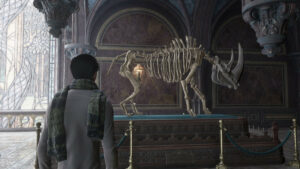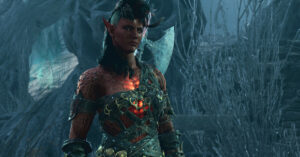As I watched the evening take hold of the city of Baghdad, standing atop a domed building, I heard the growing sound of the Muslim call to prayer, the athaan. The chant bathed the city — a sonic reminder to Baghdad’s citizens of their religious duties. Yet, here was my character, an assassin, bathed in blood rather than piety, scouting the movements of his next target. Mashallah, I thought, for the first time in a game.
Set in 9th-century Baghdad, during the reign of the Abbasid caliphate, Assassin’s Creed Mirage focuses entirely on new protagonist Basim Ibn Ishaq, who was first introduced in Assassin’s Creed Valhalla as Eivor’s mentor. Taking place several years before the events of the Viking epic, Mirage tells a kind of origin story of Basim, one in which he goes from street thief to master assassin in his homeland of Iraq. Mirage plays much like the earlier games in the open-world series, with diverse mission design and unique set-pieces, often framed around investigation and social stealth in hyper-localized locations — but it also retains some of the frustrations that have dogged every game in the long-running, time-hopping tale.
Mirage focuses heavily on Basim’s fight against the Order of the Ancients (the future Templars), a powerful, shadowy group that uses Baghdad and its populace to their own ends. Innocents are brutalized, freedom is stripped, and the city suffers. As in Assassin’s Creed Unity, there is a strong focus on the Assassins as a group, with their strange rituals and ranks.
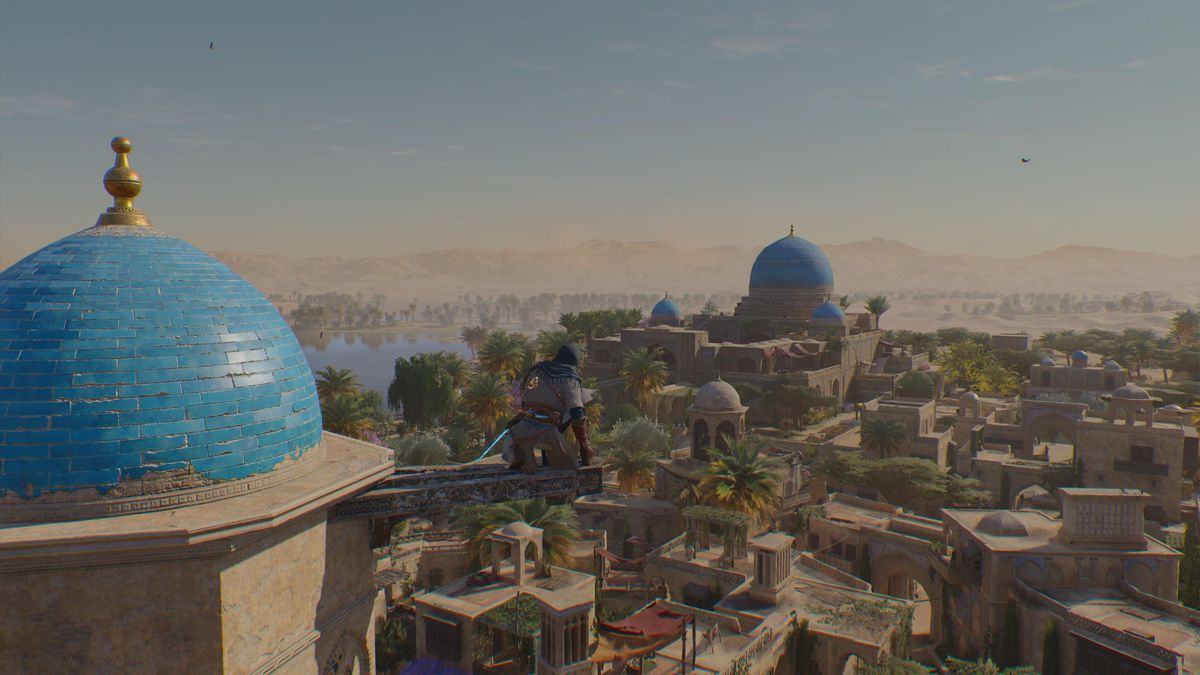
Experience points are gone now, after pervading the most recent RPG-esque entries, including Origins and Odyssey. Instead, new skills, equipment, and character progression are gated by individual missions, and contextualized in the twists and turns of the story. Basim’s main skill is his focus ability, which allows him to drastically slow time, locate enemies, and teleport to them instantly, before assassinating them promptly. This brutal ballet looks and feels like nothing else in the franchise, and it’s a continual joy to execute and behold.
As in many of the Assassin’s Creed games (especially the initial 2007 title, which Mirage heavily pulls from), targets must be observed and analyzed; once you’ve sussed out their patrol routes, habits, or weaknesses, you can then set about turning the environment to your advantage (and their disadvantage), slinking through gaps in security or the literal walls. Basim is constantly encouraged, by his various mentors and friends, to take things slow, and the story structure echoes this demand for scrutiny. Assassinations are the end result of a methodically paced setup — eliminating guards, hiding in bushes or containers, working painstakingly to remove obstacles, and finally eliminating a target was constantly rewarding. I lured my first major target out by convincing a merchant, who owed me after a previous mission, to loudly make a scene.
Taken together, Mirage is a gentle reset — rather than a reboot — of the franchise, going back to its roots in terms of mechanics, yes, but also Muslim culture. Gone are endless filler fetch quests and maps bloated with icons. In place of the vast swaths of entire countries that have composed the past three games in the series, you’re now exploring a single city, unpeeling its neighborhoods and shadowy corners as the plot progresses.
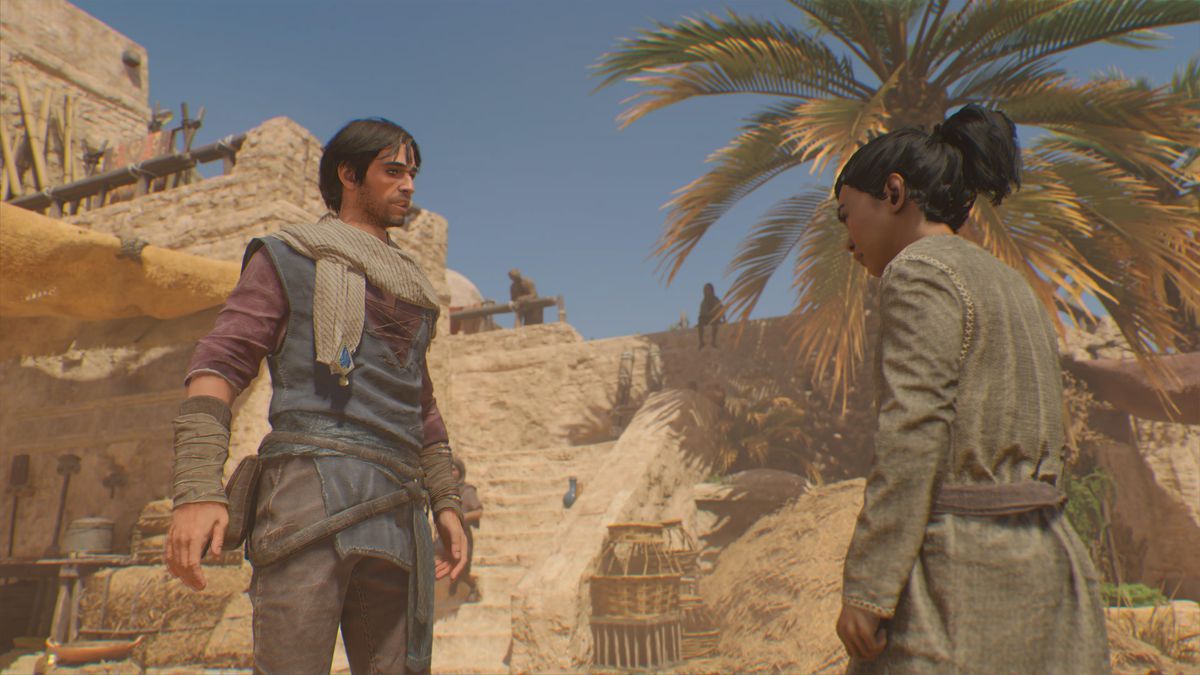
Districts are distinct, with buildings that showcase wealth or poverty, labor or government. The Round City, for example, houses the richer merchants and government officials, whereas the Harbor District is covered in discarded fish barrels and dilapidated buildings. Mosques also dot the landscape, and I was pleasantly surprised to hear the aforementioned athaan several times during each in-game day.
As someone whose entire childhood was Muslim, I feel at home with Mirage’s characters. Whether through the various sayings that populate its dialogue — shukran (“thank you”), asalam wa-alaikum (a Muslim greeting), shaytaan (“Satan”), etc. — or the various wardrobes, with robes, sequins, and Islamic-infused jewelry, that pepper its cityscape. Mirage — when it’s not focused on hunting, violence, and or corruption — brings me back to happier times. Though I am an atheist, I cannot simply strip away my history. Even my name is Arabic.
The English and Arabic performers are superb in Mirage — both of Basim’s voice actors do a stellar job, showcasing his hard-nosed passion for the Assassins’ goals, but also his vulnerability when truths are revealed that upend his entire world. (Lee Majdoub voices the English and Middle Eastern actor Eyad Nassar provides the Arabic.) The standout, however, is Basim’s mentor, Roshan, performed again by velvet-throated Shohreh Aghdashloo after her first appearance in Assassin’s Creed Valhalla. Sourcing such incredible performers with Middle Eastern backgrounds solidifies Ubisoft Bordeaux’s authentic and accurate engagement with the world it set out to create.
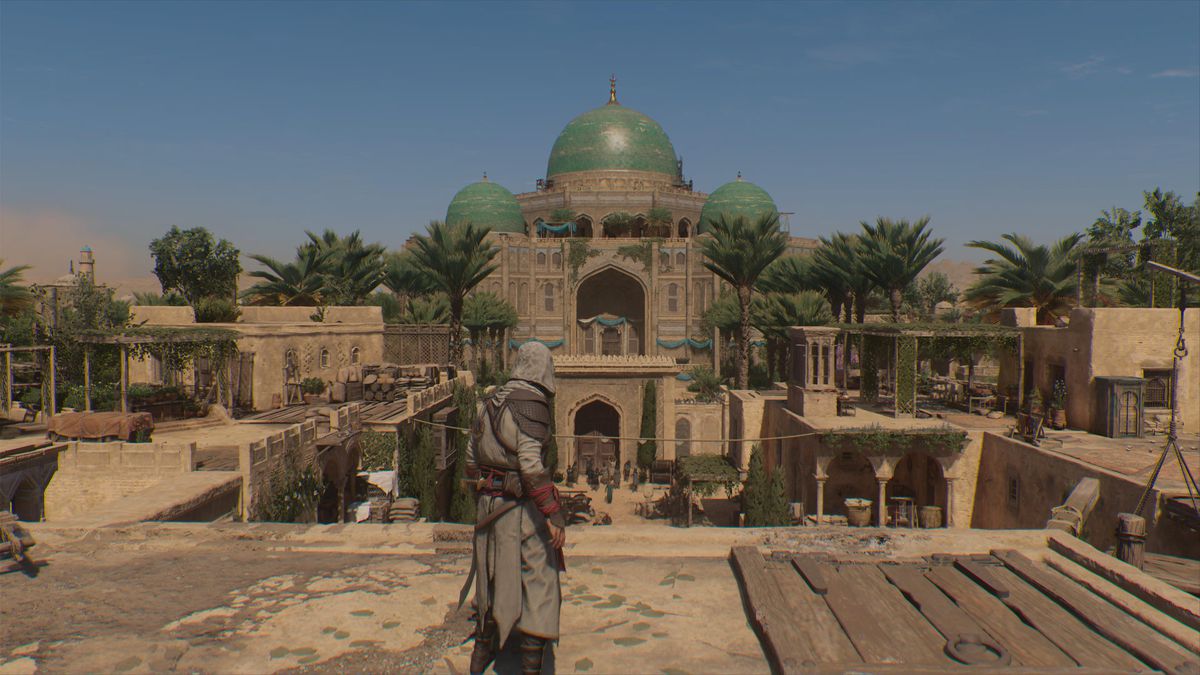
Despite being an altogether smaller, more focused game than its immediate predecessors, variety is the golden thread throughout Mirage. Basim has various lethal tools to upgrade: Knives can be poisoned or sharpened for greater damage, while blow darts can put enemies to sleep indefinitely or make them enraged.
Baghdad’s level design is just as assorted: Missions can be approached in a number of different ways, from different angles, leading to unique, memorable moments. Basim can wear disguises, for instance, to get to targets. One mission allowed me to dress as a eunuch to perform tasks for a concubine, only for it to turn into dark court intrigue; another saw me taking part in an auction in order to buy an item I knew the assassination target wanted, the better to secure a private audience. In a third, I had to steal a fancy mirror from a rich merchant while he hosted a garden party, but I could not kill anyone or be spotted. Basim’s skills as a silent thief came to the fore.
I won’t spoil anything about the plot, but suffice it to say, it will help immensely to have completed Valhalla, or at least to know the broad strokes of its story — the end of Mirage will make no sense otherwise. That’s not to say that it will make complete sense — I played Valhalla, and the particulars of Mirage’s ending still largely eluded me. For all my appreciation of the setting and world that Ubisoft Bordeaux has built, Mirage does not escape the school of Assassin’s Creed games whose endings are unclear, abrupt, and lacking.
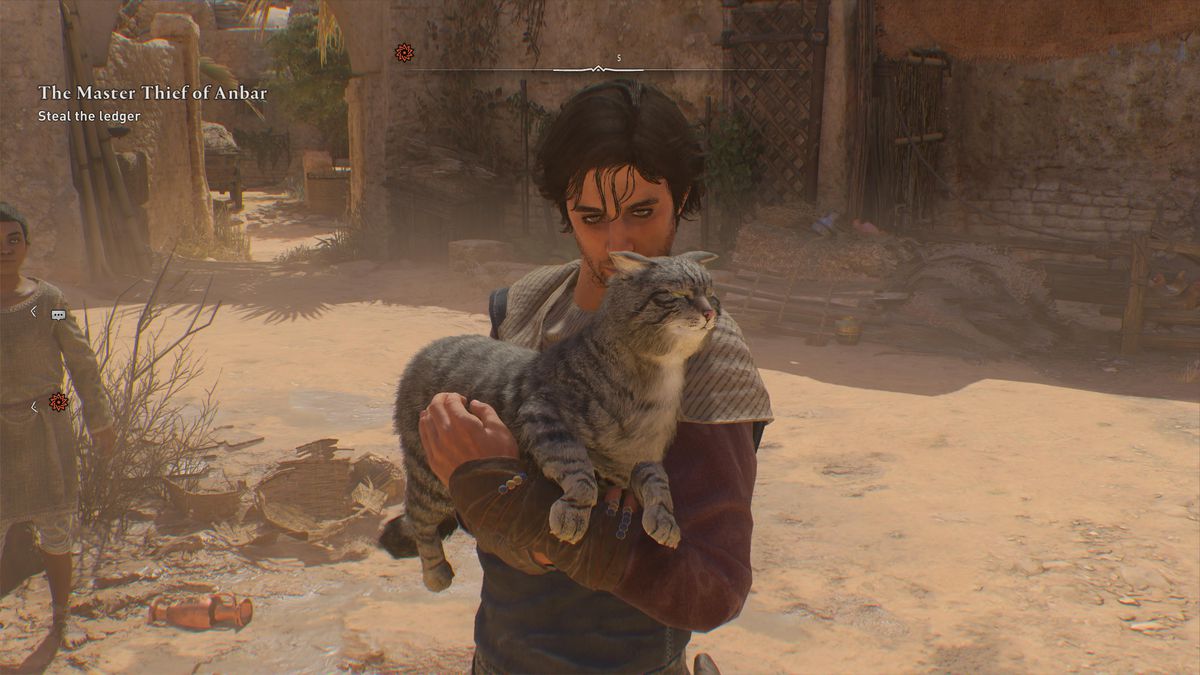
Furthermore, while Basim is the most responsive character I’ve controlled in the franchise, he still got stuck in walls, performed accidental jumps, and often broke stealth during tense moments throughout my playthrough. For a game very focused on quiet assassination, it was unfortunate (to say the least) when Basim magnetized toward a nearby ledge against my will, revealing me to a nearby guard. These instances felt worse than they ever have in the series. Thankfully, they are few, and you can always use your tools, like smoke bombs, in clever ways to escape or quickly dispatch enemies.
The game is mostly beautiful, especially the buildings, natural environments, weather, textures, and clothes. It also ran at a buttery-smooth 60 frames per second on PlayStation 5 for the vast majority of the game. Unfortunately, the character models, despite their period- and location-appropriate garb, are not as well crafted, as if they’ve been pulled from the Xbox 360 era. Faces are often vacant, with little differentiation between extreme anger or jubilant joy — they display the same nuance in emotions as Sims do. While the performers do a good job vocally, and the writing is excellent, the barely detailed faces make it a struggle to connect.
All told, though, Mirage may very well be my favorite entry in the franchise (after Origins). By focusing on stealth and assassinations-as-puzzles, and keeping the map and missions small but layered, Mirage has shed the bloat of its recent predecessors. The result is a more refined game, from a studio that knows when to exercise restraint, and when to let Basim display his violent talents.
Mashallah, I say again. Welcome back, Assassin’s Creed.
Assassin’s Creed Mirage will be released on Oct. 5 on PlayStation 5, Windows PC, and Xbox Series X. The game was reviewed on PS5 using a pre-release download code provided by Ubisoft. Vox Media has affiliate partnerships. These do not influence editorial content, though Vox Media may earn commissions for products purchased via affiliate links. You can find additional information about Polygon’s ethics policy here.
- SEO Powered Content & PR Distribution. Get Amplified Today.
- PlatoData.Network Vertical Generative Ai. Empower Yourself. Access Here.
- PlatoAiStream. Web3 Intelligence. Knowledge Amplified. Access Here.
- PlatoESG. Carbon, CleanTech, Energy, Environment, Solar, Waste Management. Access Here.
- PlatoHealth. Biotech and Clinical Trials Intelligence. Access Here.
- Source: https://www.polygon.com/reviews/23901831/assassins-creed-mirage-review-baghdad-steam-release
- :has
- :is
- :not
- $UP
- 1
- 212
- 220
- 28
- 60
- 7
- 8
- 9
- a
- ability
- About
- accidental
- accurate
- actors
- ADvantage
- Affiliate
- After
- again
- against
- All
- allowed
- allows
- also
- altogether
- always
- am
- an
- analyzed
- and
- anger
- Another
- anyone
- anything
- appreciation
- arabic
- ARE
- around
- AS
- assassin
- At
- Auction
- audience
- Authentic
- away
- back
- backgrounds
- barrels
- BE
- beautiful
- been
- before
- being
- BEST
- best games
- Better
- between
- Bloat
- blood
- blow
- board
- both
- broad
- Broke
- Building
- built
- but
- buy
- by
- call
- came
- CAN
- cannot
- CAT
- character
- characters
- Citizens
- City
- cityscape
- clothes
- code
- commissions
- Completed
- composed
- Connect
- constantly
- Containers
- content
- controlled
- corners
- Corruption
- could
- countries
- Court
- covered
- crafted
- create
- Culture
- Cut
- damage
- Dark
- day
- Demand
- Design
- Despite
- detailed
- dialogue
- different
- Disadvantage
- Dispatch
- Display
- distinct
- district
- diverse
- do
- does
- DOT
- download
- drastically
- during
- each
- Earlier
- earn
- eastern
- echoes
- Editorial
- eliminating
- else
- emotions
- encouraged
- end
- ending
- Endless
- ends
- enemies
- engagement
- English
- Entire
- entirely
- entry
- Environment
- environments
- EPIC
- equipment
- Era
- escape
- especially
- etc
- Ether (ETH)
- ethics
- Even
- evening
- events
- EVER
- Every
- example
- excellent
- execute
- Exercise
- Exploring
- extreme
- faces
- Favorite
- feel
- felt
- few
- fight
- Finally
- Find
- First
- first time
- Fish
- Focus
- focused
- focuses
- focusing
- For
- fore
- Franchise
- Freedom
- friends
- from
- front
- Frustrations
- future
- game
- Games
- gaps
- Garden
- gated
- gentle
- get
- Goals
- Goes
- going
- Golden
- gone
- good
- good job
- got
- Government
- Government Officials
- greater
- greeting
- Group
- Growing
- Guard
- had
- happier
- harbor
- Have
- he
- hear
- heard
- heavily
- help
- her
- here
- him
- his
- history
- hold
- holds
- Home
- homeland
- hosted
- houses
- However
- http
- HTTPS
- Hunting
- i
- icons
- if
- immediate
- immensely
- in
- in-game
- Including
- incredible
- individual
- influence
- information
- initial
- instance
- instantly
- instead
- into
- introduced
- investigation
- iraq
- IT
- ITS
- jewelry
- Job
- jpg
- jumps
- just
- keeping
- Kill
- Kind
- knives
- Know
- knows
- labor
- lacking
- landscape
- largely
- layered
- leading
- least
- Lee
- let
- Level
- like
- links
- little
- locations
- LOOKS
- Main
- major
- Majority
- make
- MAKES
- many
- map
- Maps
- master
- May..
- me
- mechanics
- Media
- memorable
- mentor
- Merchant
- Merchants
- Middle
- Mirage
- mirror
- Mission
- missions
- models
- Moments
- more
- most
- mostly
- movements
- much
- must
- my
- name
- Natural
- New
- Newsletter
- next
- no
- Notes
- nothing
- now
- Nuance
- number
- observed
- obstacles
- Oct
- of
- officials
- often
- on
- once
- ONE
- only
- or
- order
- Origin
- otherwise
- out
- owed
- own
- paced
- part
- partnerships
- party
- passion
- past
- Patch
- patch notes
- PC
- per
- perform
- performed
- performers
- Place
- plato
- Plato Data Intelligence
- PlatoData
- played
- plays
- playstation
- PlayStation 5
- points
- policy
- Polygon
- Polygon’s
- Poverty
- powerful
- previous
- private
- Products
- progression
- protagonist
- provided
- provides
- PS5
- purchased
- put
- quests
- quickly
- ranks
- rather
- real
- recent
- refined
- released
- remove
- responsive
- result
- retains
- Revealed
- revealing
- reviewed
- rewarding
- Rich
- roots
- round
- roundup
- routes
- same
- saw
- say
- scene
- School
- scrutiny
- Second
- secure
- security
- sense
- Series
- SERIES X
- set
- setting
- setup
- several
- shed
- showcase
- showcasing
- sign
- simply
- sims
- single
- skill
- skills
- sleep
- slow
- small
- smaller
- Smoke
- Social
- solidifies
- some
- Someone
- Sound
- Sourcing
- Speaks
- Stealth
- Stellar
- Still
- Story
- strange
- street
- Strip
- strong
- structure
- Struggle
- studio
- such
- Suffers
- surprised
- tabby
- Take
- taking
- tale
- talents
- Target
- targets
- tasks
- tells
- terms
- than
- that
- The
- The Future
- The Landscape
- the world
- their
- Them
- then
- There.
- These
- they
- things
- Third
- this
- though?
- thought
- three
- Through
- throughout
- time
- times
- Title
- to
- together
- told
- tools
- toward
- Tower
- TURN
- Turning
- turns
- twists
- Ubisoft
- unclear
- unfortunate
- unfortunately
- unique
- upgrade
- use
- uses
- using
- variety
- various
- Vast
- very
- via
- Voice
- VOICES
- VOX
- vox media
- vulnerability
- W3
- wanted
- was
- ways
- Wealth
- Weather
- webp
- weekly
- welcome
- WELL
- when
- whereas
- whether
- which
- while
- WHO
- whose
- will
- windows
- with
- wood
- working
- world
- worse
- writing
- X
- xbox
- xbox series
- Xbox Series X
- XML
- years
- yes
- yet
- you
- Younger
- Your
- zephyrnet


